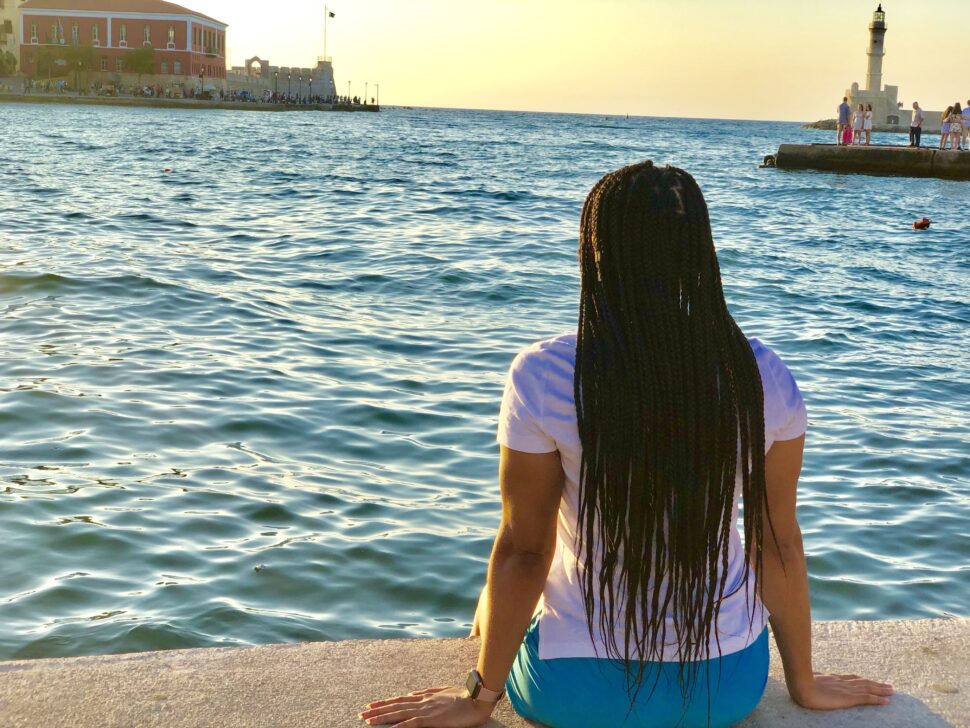Collegiate coach and retired WNBA player Sydney Carter knows a thing or two about traveling. Her professional endeavors have taken her all over the world. From dribbling alongside her Chicago Sky teammates on basketball courts across the U.S. to playing internationally for teams in Israel and Latvia, Carter has visited more destinations than most. And each one helped evolve her.
“Traveling kind of makes you OK with being out of your comfort zone,” Carter said. “And then that’s when you’re going to grow and learn the most when you get out and you expand your roots.”
Originally from Dallas, Carter’s professional career began in 2012. She spent four years playing in the WNBA, serving as a guard for teams in Chicago, Indiana, Connecticut, and Atlanta. During those same years, she played overseas and continued as an international player until 2019, after leaving the WNBA. When she wasn’t on the court, Carter would drive through Jerusalem and party in Israel. She lived a soft life in Latvia, walking to doughnut shops and grocery stores close to home. Both experiences helped mold her into who she is today, as her career took her to many corners of the world.
Now five years into her new journey as a coach at the University of Texas at Austin, Carter reflects on how her travels have helped shape her career and how, no matter where she goes, she’ll always return home.
Time Spent Living And Playing Overseas

Although Carter played professionally for teams in Israel and Latvia, away games took her across Europe to compete. The coach says her experience was different in each country. However, as an athlete, she was well-received in both destinations.
“As far as being an athlete in both places I was received very well,” she said. “You’re a superstar over there, so people recognize you all the time.”
In Israel, Carter discovered their culture and society were extremely Americanized. She saw many Black travelers and ex-pats, so it wasn’t unusual for Israelis to see African American faces. Many locals would often mistake her for being Cape Verdean.
“Being Black over there, because there’s so many athletes that are American, they’re used to seeing it,” she said. “And so, it’s kind of normal over there.”
English is widely spoken across Israel. However, Carter encountered a language barrier during her first year playing in Latvia. With locals speaking both Latvian and Russian, she struggled to acclimate as an English speaker. She also noticed a stark difference in the number of Black faces in Latvia compared to living in Israel.
“I saw maybe two or three Black people and I was one of them the entire time that I was there,” she said.
After taking time to learn about the culture and Latvian language, Carter was more confident returning to play in her second year. Despite gaining familiarity with the countries she played in, she vividly remembers being afraid when visiting some locations. While playing in Turkey, she didn’t want to explore the city or venture far from her hotel. However, she didn’t allow fear to stop her from experiencing traveling internationally firsthand.
“You’re never going to be able to see everything that the world has to offer if you live in fear,” she said.
Her time in Israel and Latvia helped cultivate her as a dynamic basketball player and individual. She was miles away from her family in Dallas and missed significant events and milestones. However, her time away built a steadfast resilience within her. Stepping outside her comfort zone allowed her to see the world and increased her fondness for home.
“It has allowed me to get out of my comfort zone and live in other places, live in other states, and live in other countries,”she said. “It allows me to embrace other cultures and to understand where people come from so that I can have an appreciation of where I come from.”
Black People Should Be Seen

One important factor in her travel journey was ensuring foreign locals saw her face. Carter says that too often, seeing Black travelers isn’t normal in some destinations. In Latvia, she remembers passing a local woman who clutched her child closer when she walked past her. These types of experiences remind her how important it is for African Americans to be seen in international destinations.
“I think my experience in Latvia when I saw the little girl’s mother clutch her, it’s in that moment that you realize that Black people are so foreign, but to us, it’s just like, we don’t understand why,” she said.
Because she was a known athlete, Carter’s experience could be different for other Black travelers venturing into international lands. However, she believes it’s essential for African Americans to travel internationally to show that the culture extends beyond U.S. borders.
“I think the importance of getting out there is to bring awareness to ourselves and other people that we are normal,” she said. “I think this is something that goes back into times when I wasn’t even alive.”
Now, back in Texas, close to home, Carter is invested in building up a new generation of student-athletes. But the memories of her time traveling as a player flood back to her regularly and remind her of how far she’s come, how much she’s grown, and how each destination helped shape her reality and perspective on life.
“I’ve always been where my feet have been at and I’ve always embraced every stage of my life and every place that I’ve been in,” she said. “I think I’ve gotten the most out of every place I’ve been in.”





